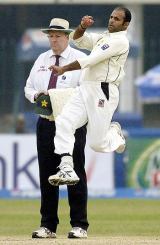Playing safe could mean sorry
The omission of Naved-ul-Hasan may backfire
Osman Samiuddin in Faisalabad
21-Jan-2006
|
|

|
We know which selectorial decision from this morning will attract more headlines, but the one Pakistan made is probably, on the surface, more surprising. Having scored nearly seven hundred runs in Lahore and conceded over 400 in exchange for only one wicket, you wouldn't have thought shoring up the batting, at the expense of an opening bowler was really necessary. Inzamam-ul-Haq had hinted pre-match at a couple of changes in the attack but few thought that Rana Naved-ul-Hasan would be dropped. Fewer could have imagined he would make way for Abdul Razzaq.
The move didn't feel right; it isn't so much about who the better performer is as it is about what it says of Pakistan's approach to the match. In light of Virender Sehwag's taunting about defensive mindsets, it seemed to confirm, on the surface, his views. Razzaq may do well with the ball - it is being said that the pitch may suit his skiddy medium-pace of nip, cut and seam - but he hasn't played a Test in seven months. In them, he has threatened and promised more with bat rather than ball. Rana, on the other hand, has just begun to look like he can handle Tests; he is also a frontline bowler and against India on a good wicket, he may have been crucial. Suddenly, Pakistan's attack has an impoverished look to it and the pressure on Mohammad Asif, in only his second Test and on much hype, will only be enhanced.
Because Pakistan's batting has been so pleasingly solid in recent months, the move seems more defensive. The morning start missed becoming the fifth fifty-run opening stand in the last eight innings by one run. The century partnership between Younis Khan and Mohammad Yousuf was their third against India, fourth overall and tenth above 50 in 35 Tests together. As Inzamam approaches the dusk of his career, they make heartening statistics for Pakistan.
But around the soothing presence of Inzamam, there also reside Shahid Afridi at six and Kamran Akmal at seven, two allrounders who have made five Test hundreds in the last year. When you have a No.6 who forces captains to place five men on the boundary so soon after his arrival then what need is there really to have another safeguard?
The second Test against England in November provides a remarkable parallel to what happened this afternoon. On the same day of the month (21st), on this ground, on the opening day, a similar reception, situation and the same partner awaited Shahid Afridi. It was 201 for 4 then and 216 for 4 for now. Afridi biffed and bashed 92 in a 145-run stand with Inzamam for the fifth wicket but here he played a more circumspect and calculated innings. Having imposed himself early with three successive fours, forcing fielders back, he calmed down, picking up singles here, doubles there and the odd boundary whenever he felt like it.
Afridi being Afridi, at some point an eruption had to come and as India tired in the sun, in the 87th over of the day, it arrived. Among the many things about Afridi that astonish is how often one boundary generally means a tirade of them in the same over. Of the 22 from that over, he blasted 20; against Kumble earlier he took three in three balls. At Lahore came 27 in one over and against England, it was much the same. Once he feels it, his momentum is frightening and probably unique.
By the close, with Inzamam he had looted 163 runs and as against England, had turned a middling position into a dominating one. Rana, having taken ten wickets in a domestic game here, just before the England Test, took five against them in his most incisive Test appearance to date. Afridi's 85 - somehow it still ended at more than a run-a-ball - was just one more reason, perhaps, why Pakistan might rue not playing one of their most improved frontline bowlers from the last year.
Osman Samiuddin is Pakistan editor of Cricinfo